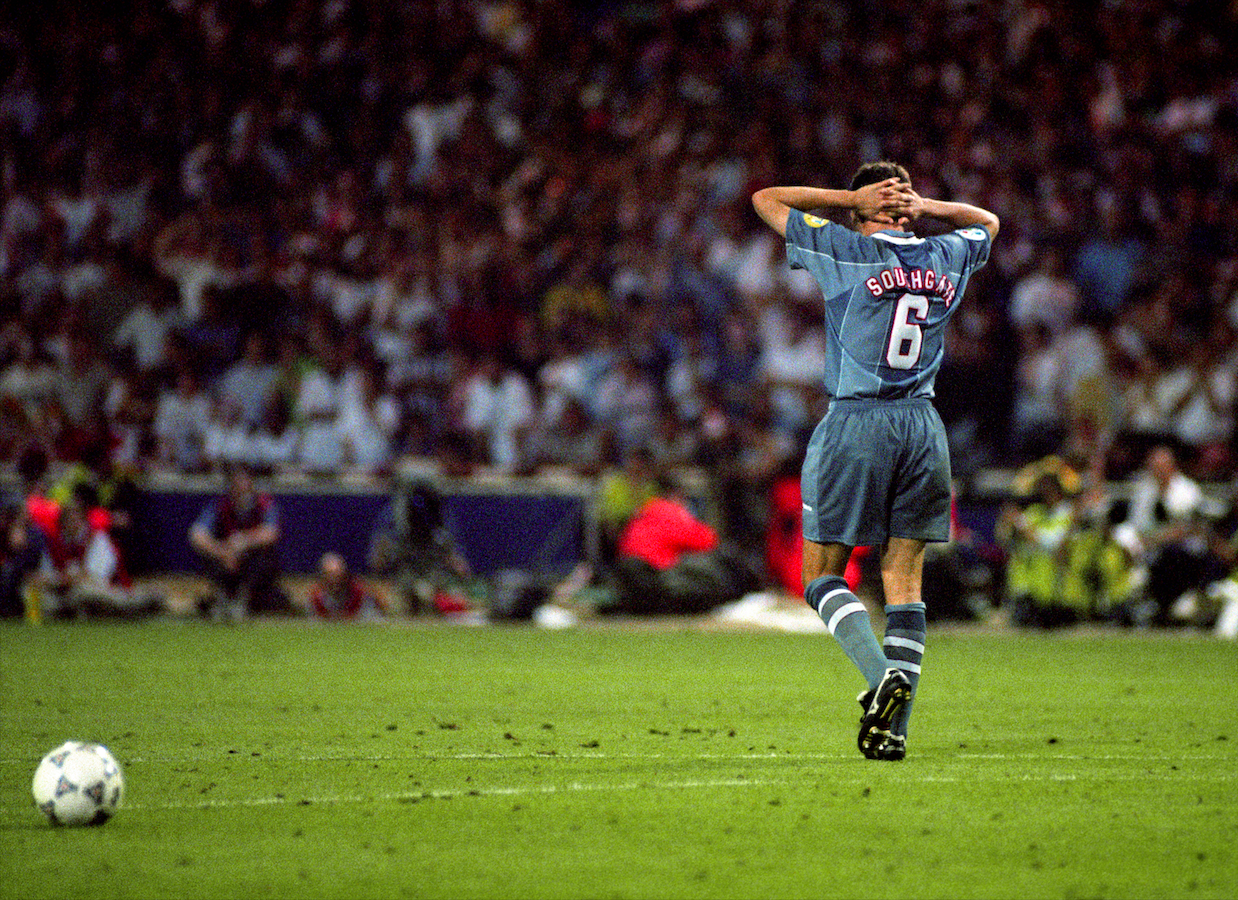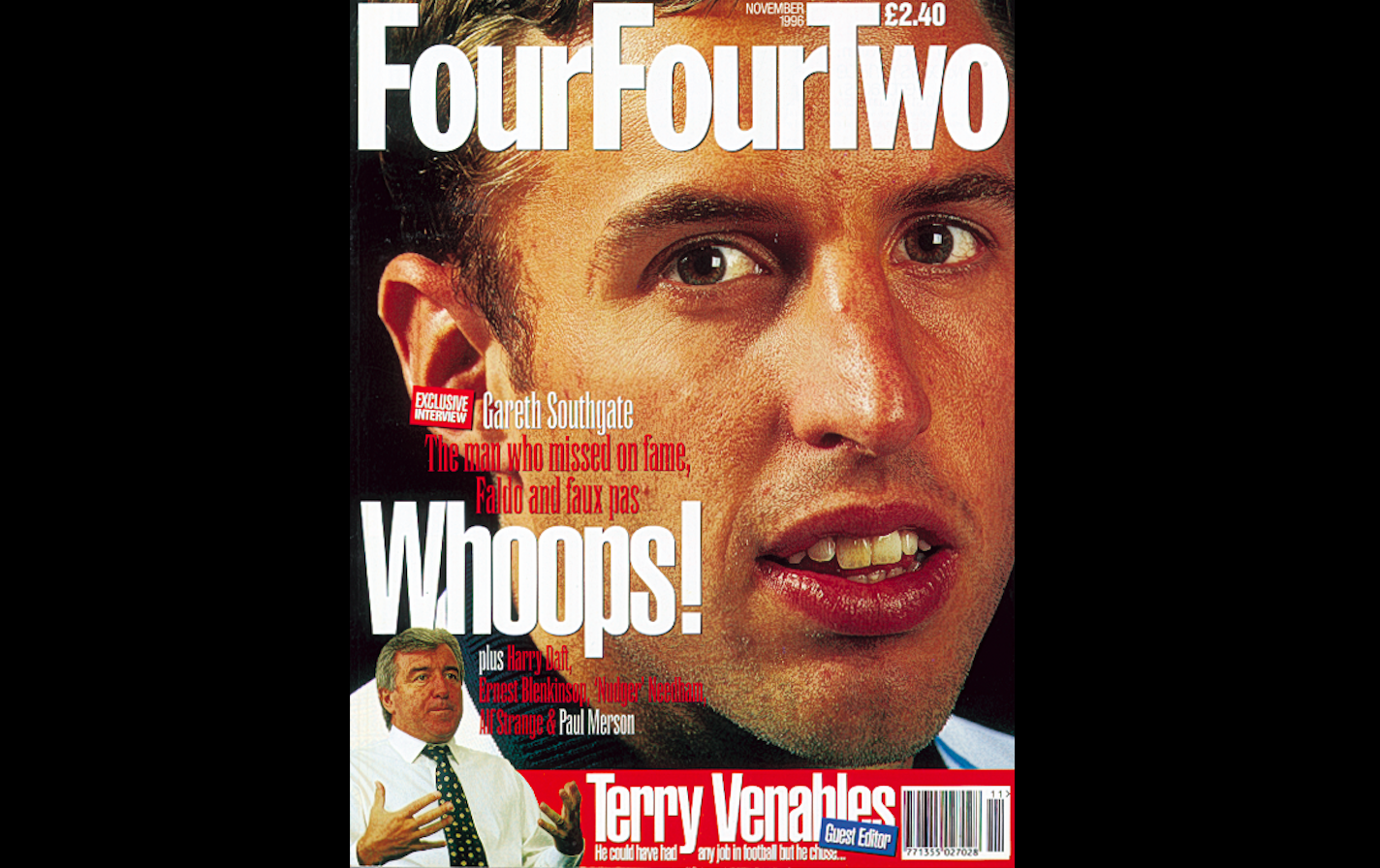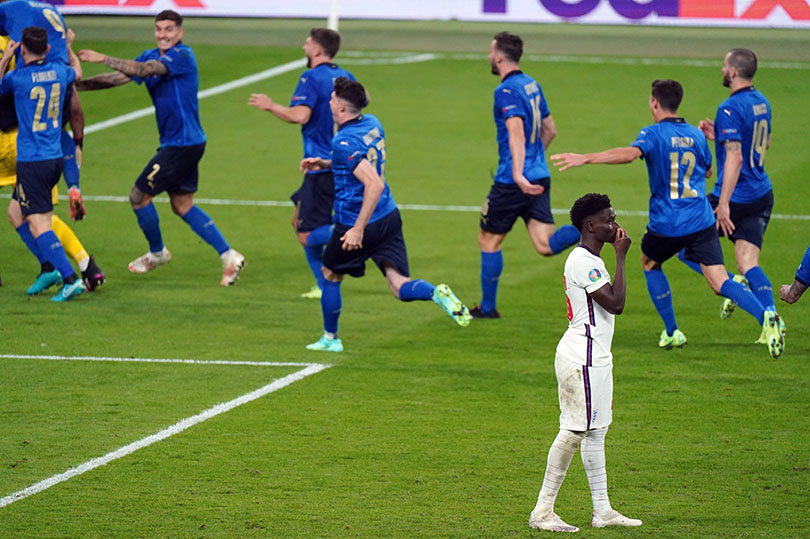
There was one topic that wasn’t supposed to be on the agenda when FourFourTwo interviewed Gareth Southgate for our cover story in November 1996.
It was a subject that had already been dissected, analysed, sliced and diced by every hack with a story to spin; examined by academics about its effects on the national psyche; and even fussed over by physicists looking for the perfect equation to prevent it from happening again.
Even so... we could hardly ignore that penalty.
As fellow members of the Sorry Shootout Club, Stuart Pearce and Chris Waddle knew what Gareth was going through following his nightmare moment on June 26, 1996. At the 1990 World Cup they, too, had missed when it mattered in a semi-final against (West) Germany.
But this time felt different. This time, England were riding a wave of national euphoria in their own country. This time, only a penalty shootout separated them from a Wembley final as favourites against the Czech Republic. And this time, when it went wrong, Southgate would shoulder the burden alone.
England and Germany had both emphatically converted five penalties – Alan Shearer and Thomas Hassler; David Platt and Thomas Strunz; Stuart Pearce and Stefan Reuter; Paul Gascoigne and Christian Ziege; Teddy Sheringham and Stefan Kuntz. They all combined to ensure the hosts’ hopes rested on a greenhorn defender stepping up first in sudden death.
It seems almost cruel in hindsight, ending as it did with the addition of another sorry chapter in the Three Lions’ sob annals. Andreas Kopke denied him from 12 yards, and his strutting namesake Moller ruined the party for a nation unequipped for the giant comedown.
If only that was where it finished for poor Southgate, whose life was about to be turned upside down. Four years earlier, he had watched his country fail to win a game at Euro 92 in Sweden.
The tournament is all but forgotten in England; it’s almost easier to accept being so bad. But in an interview with The Independent later in 1996, Southgate admitted to something of a premonition.
“I’d thought, in a sort of fantasy world, that the European Championship in England would be an ideal time to break into the team,” he said. “Four years ago, when I was watching the finals on holiday in Portugal, I turned to my best friend and said, ‘It’d be great to be involved in that in ’96'.”
Back then, England’s future 57-cap international, Euro 96 fall guy and successful manager was a 21-year-old defender, going into his second full season as a professional with Crystal Palace. It’s unlikely that he felt so romantic when that time finally came and went, and the madness of missing a penalty in a shootout for England hit him like a freight train.
It’s easily forgotten how inexperienced Southgate was at international level in 1996. He went from making his senior England debut at home to Portugal in December 1995 to becoming an automatic pick in defence, despite the opening game of Euro 96 bringing only his fifth cap. He then became one of the tournament’s most impressive breakout stars.

FourFourTwo's November 1996 issue
“He had so few games before Euro 96, yet he handled the whole thing beautifully – which didn’t surprise me,” wrote Terry Venables, FFT’s guest editor for that November 1996 issue when Southgate adorned the front cover.
In a previous life, Venables had co-authored five books and helped to create late-70s ITV detective drama Hazell. He also penned a dozen articles for this very magazine, including one about the defender who would follow in his footsteps as an England manager.
“He’s a loquacious chap,” wrote Venables, “but he does it very well and doesn’t try to be too intelligent so it disturbs you. I spoke to Gareth about certain things I felt he could improve on: his speed coming out from the back and his long-range passing. He thought about them and did improve.”
Good job, really: after easing in against Switzerland and Scotland, Southgate was given the task of trying to nullify Dennis Bergkamp. And, although Arsenal’s mercurial star did squander one good chance, he was otherwise a peripheral figure in England’s 4-1 demolition of the Netherlands.
The press accused Bergkamp of not turning up, which irked his marker. As Southgate explained: “Terry studied the Dutch for two years and came up with a game plan which involved switching to a back four. I didn’t enjoy it as much as everybody else because I had to mark Dennis... it was bloody hard work.”
England beat Spain on penalties in the last eight, Southgate’s display in the goalless draw compelling Bobby Charlton to call him “world-class”.
His summer then took a turn for the surreal. One day Gareth was singing God Save The Queen at Wembley; the next he was introducing the band who had released a slightly different take on the national anthem.
The England squad were staying at a hotel over in Burnham Beeches, Buckinghamshire, but Stuart Pearce was keen to watch the Sex Pistols in London, playing live for the first time in nearly 20 years. Pearce asked Venables if he could go, promising he would return by 9pm.
His manager wasn’t convinced, but when Pearce added he would be attending with Southgate (who had no interest in punk music but fancied going along for the ride) as well as England’s head of media, Steve Double, Venables relented.
A couple of hours later, Southgate and Pearce were on stage introducing the Sex Pistols to 30,000 tanked-up punks in Finsbury Park. “Twelve months earlier, I wouldn’t have been asked to announce the Croydon Male Voice Choir,” chuckled Southgate.
There was a similar sense of anarchy in the UK during the Three Lions’ semi-final with Germany, days later. Across 90 minutes and extra time, Alan Shearer headed the hosts in front, Stefan Kuntz equalised, Darren Anderton hit a post, Kuntz had a second goal chalked off for a foul and Paul Gascoigne came within millimetres of scoring a winner. Venables, having used every substitution available in the four preceding matches, made no changes at all throughout the 120 minutes.
Then came the shootout. Ten spot-kicks, all scored. Southgate’s long run-up. The weak sidefoot. Kopke’s save. England team-mate Paul Ince remembers the devastation of an “inconsolable” Southgate – the kind of suffering Ince would endure two years later after his own penalty woe at France 98.
“I think because it was at home, he took a lot of grief from it,” the former midfielder tells FFT. “He had the right people around him: Tony Adams, Pearcey, because he was close to them. You never put the blame on anyone’s plate. You could look back and say, ‘Well, we should have scored there and it wouldn’t have gone to penalties’.
“The last thing you want is for people to say, ‘Don’t worry, forget about it, just forget about it’. You know you can’t forget about it – you’ve just f**king missed a penalty.”
As if that miss wasn’t enough for Southgate to take in, Liam Gallagher and Prime Minister John Major were among the first people to console him after he emerged from the sanctuary of the dressing room. Major, a cricket fan, called him ‘Gary’. And then there was the media, to whom a broken Southgate simply said, “I feel I’ve let the whole country down.”
That night, England’s players returned to their hotel and attacked the bar with gusto. The session continued until 6am and eventually ended with Gascoigne discovering that someone had defecated in his washbag. Southgate, meanwhile, phoned his mum, who asked, 'Why didn’t you belt it?'
As he went back into the bar, Adams broke the tension by jokingly calling him a “bleedin’ German... you know you’ve let us down”. Perhaps unsurprisingly, Southgate spent most of the evening speaking to Pearce and Venables.
If Southgate’s experience was a painful one, he at least grew stronger for it. He would later explain that, when considering his ordeal, he was drawn to a quote from former US president Theodore Roosevelt: “It is not the critic who counts; not the man who points out how the strong man stumbles, or where the doer of deeds could have done them better. The credit belongs to the man who is actually in the arena.”
But still the vultures circled. One magazine offered the centre-back and then-girlfriend, Alison, £40,000 for an exclusive interview, which they flat-out rejected. Reporters camped outside his home and that of his mother anyway, waiting for scraps to devour.
The defender even had a song written in his ‘honour’ by punk group The Business, imaginatively named Southgate (Euro 96), with the Three Lions-inspired chorus cheerfully announcing: “Southgate’s going home, he’s going – oh no, he’s missed the bus (you c**t!)” Southgate beat a retreat to Bali with his future wife before Germany even won the final on June 30.
Later, Southgate appeared in a self-mocking Pizza Hut advert beside fellow shootout scapegoats Pearce and Waddle, and did his best to put things into perspective. He had been sent countless letters of support, including plenty from disabled children revealing Euro 96’s positive impact on their lives – and, incredibly, one letter from the babysitter of a child killed in the Dunblane primary school massacre earlier that year.
“The babysitter wrote to me and said she’d had a bad time of things, and she knew I had,” Southgate recalled to FFT. “But what happened to me doesn’t bear comparison with something like that. And that was the gist of many of the letters I got. Consequently, I’ve learned from them.”
Southgate also received correspondence from the man who, a couple of months earlier, had asked: 'Gareth, if it goes to six, will you take one?'
As Venables revealed on these pages in 1996: “I wrote all of the players a handwritten letter – I hope he got it. I wanted him to know how I felt; that people will always talk about it, but no one will blame him.”
In fact, Southgate didn’t agree, and in many ways he was correct. He concluded our 1996 interview with a sober reality check. “Everything I’ve done so far and maybe in the future could be overshadowed,” he said. “Fans will instantly recall the penalty miss.”
The 25 year old didn’t know it at the time, but Euro 96 was as good – and bad – as it got for him at international level. He was injured during England’s first match at France 98 and came on as a substitute in their ill-fated last-16 tie against Argentina. At Euro 2000, he played just nine minutes as England failed to make it out of their group, and at the 2002 World Cup he was an unused substitute.
Southgate became England manager by luck rather than design back in 2016, having initially rejected the job before Sam Allardyce was hired. Soon after Southgate’s appointment, however, he was able to rationalise and reflect on his experiences of 1996, which he believes gave him an advantage over other applicants.
Suddenly, the lowest moment of his career became something to put at the top of his CV. He reflected ahead of leading England to Euro 2020: “I look around and think, ‘Who of my compatriots is better placed to do this job?’ I feel that I’m best-placed. At some points in my career, I’ve underestimated what the experiences [at Euro 96] have given me and the position they’ve put me in.”
For Paul Ince, however – and perhaps for Southgate also – there is no replacing what happened in that Wembley shootout. “I don’t think you can ever parallel it with anything you do in the future,” he told FFT.
“Just like in ’98 when I missed, there’s always a time when it comes back into your head, and I’m sure it does with him. It would be great for England to win something again at last – if he’s the manager, even better – but he’ll see it as a completely different situation to Euro 96. I don’t think it will ever go away. It never does.”
Maybe not. And it means Southgate is well aware of how quickly public perception can change. Speaking in November 2019, after a week in which England qualified for Euro 2020 amid a very public spat between Raheem Sterling and Joe Gomez, the astute gaffer noted: “When you have a week like you’ve had, you sense that people can fall out of love with you. If there isn’t a warmth for you to continue, then that can start to affect the team – I’m realistic about how quickly those tides can turn.”

And turn they did. England's run to semi-finals of the 2018 World Cup had gone a long way to exorcising Southgate's demons, wtih Eric Dier's winning spot kick in a shootout against Colombia marking the first time the Three Lions had ever progressed in a World Cup knockout game via penalties having previously fallen to West Germany in 1990, Argentina in 1998 and Portugal in 2018.
Southgate's side avoided shootouts right up until the final at Euro 2020, comfortably beating Germany and walloping Ukraine before overcoming resilient surprise package Denmark in extra time in the semi-finals.
But the gods of storytelling dictated that Southgate must suffer Wembley shootout heartache at the Euros once again after sharing a 1-1 draw with Italy in that last winner-takes-all encounter - England's first appearance in a major final for 55 years.
Domenico Berardi and Harry Kane both succeeded in their respective sides' opening efforts before Jordan Pickford saved from Andrea Belotti to give Harry Maguire the chance to give England the advantage.
The centre-back duly did so, with Leonardo Bonucci restoring parity immediately thereafter. With a penalty still in hand, though, it was still advantage England...in theory.
But it all unravelled from there. Knowing better than most how difficult it could be for inexperienced penalty takers to Southgate had introduced Marcus Rashford and Jadon Sancho to the fray in the final minute of extra time specifically to get more confident players on for the shootout.
Off went Kyle Walker and Jordan Henderson, the latter of whom had drawn criticism for using his captain's privilege to overrule Dominic Calvert-Lewin and take a penalty himself in a pre-tournament friendly against Romania. That tame effort was comfortably saved; Rashford, meanwhile, had put a penalty of his own home ten minutes earlier in that same friendly.
But Southgate's gambit backfired. Rashford hit the post and Gianluigi Donnarumma saved Sancho's effort either side of Federico Bernadeschi's successful conversion, which gave Italy a 3-2 lead.
Unusually, penalty specialist Jorginho faltered, with Pickford getting across to save from the Brazilian-born midfielder, giving England another chance to level things up after five kicks each. Up stepped Bukayo Saka - England's breakout star of the tournament, just as Southgate had been in 1996.
And we all know the rest: Donnarumma dove to his left, Saka was denied, and England were once again left dejected on home turf as Italy lifted the trophy.
Southgate moved quickly after the game to try and take the blame off the trio who had missed their penalties - as well as those who had not stepped up, like Jack Grealish, who was fiercely rounded on by ITV pundit Roy Keane for not having done so before setting the Irishman right by saying he had wanted to take one but that the decision was out of his hands.
Southgate told the media after the game: "It is down to me. I decided on the penalty-takers based on what they have done in training. Nobody is on their own. We have won together as a team and it is on all of us together to not be able to win this game."
Not that that stopped some idiots from unleashing vile racial abuse at Rashford, Saka and Sancho on social media leading to 11 arrests
Southgate of course condemned the abuse in no uncertain terms, and characteristically, took that experience as a different, unwanted kind of lesson for the future.
He told the Guardian in June 2022: “I have to say [the possibility of such abuse] never crossed my mind before...it will [now]. We’ve got 55 years of talking about penalties and everything else. So now we’ve got another layer that’s going to make it extremely difficult for us to win anything.
“We went through a process of preparing for penalties. We’ve definitely reviewed that. Some of the boys have taken more with their clubs. Bukayo has taken a couple for his club, which were massively important moments that epitomised what he’s about.
"But indirectly we have created another layer of difficulty in overcoming a penalty shootout. I have got to take all these things into consideration and it is incredibly complex.”
That's Southgate all over: fronting up to his failures and re-doubling his continuous drive towards self-improvement - and, as a manager, the betterment of those in his charge.
The original version of this feature originally appeared in the February 2020 issue of FourFourTwo. Get the latest issue now!
More England features
Before Three Lions: How Baddiel and Skinner’s Fantasy Football defined football in the 1990s
What happened to England's Golden Generation? Why the country's most talented squad never came good
Gazza, the untold stories: Need-to-know tales that launched a legend







